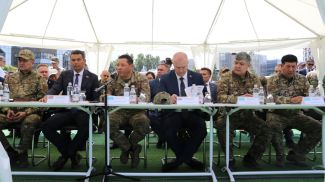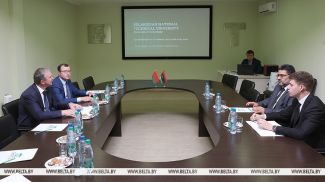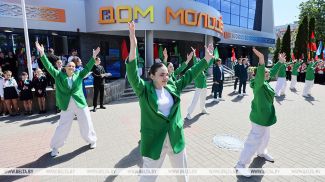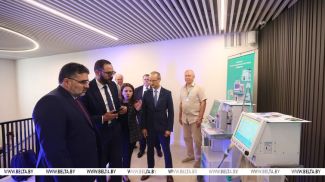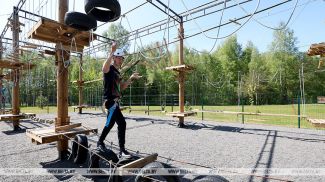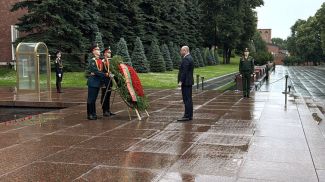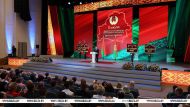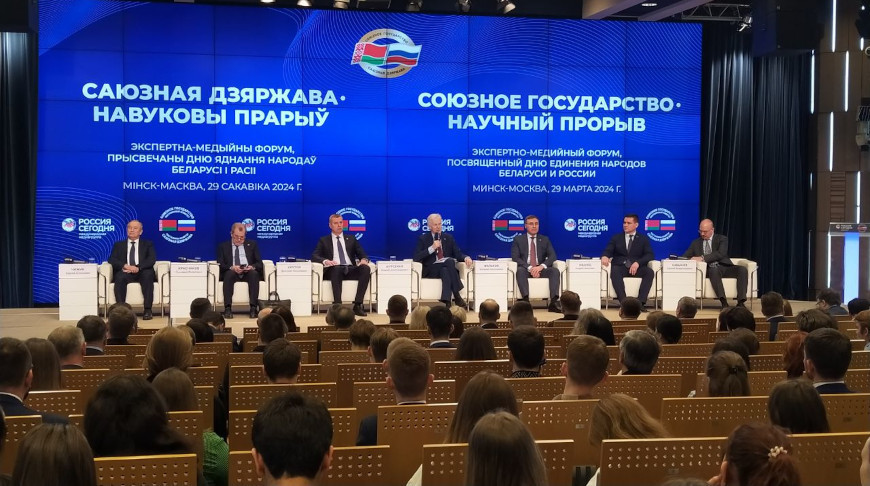
Photo courtesy of the National Academy of Sciences of Belarus
MINSK, 29 March (BelTA) – First Deputy Chairman of the Presidium of the National Academy of Sciences of Belarus Sergei Chizhik named promising areas of cooperation with Russia, BelTA has learned.
The Union State science and technology development strategy for the period until 2035 was approved at the St. Petersburg meeting of the Supreme State Council on 29 January 2024. “I will name the things that I believe should top our cooperation agenda. One of them is the convergence of the Union State legislation regulating science and technology, including the work on the Union State programs. Another area of work concerns coordinated systems for forecasting and targeted support for science and technology, interconnected priority areas of research and mega-level projects based on them. I would also mention the common market for intellectual property created through the implementation of joint programs and projects. We must jointly use the scientific infrastructure, centers for the collective use of equipment. The last, but not the least, is the system of mutual internships. We used to do this in the Soviet times, but we can go back to it,” said Sergei Chizhik.
He named areas where scientists from Belarus and Russia could collaborate effectively. “This includes a common information and communication space. It should encompass software and hardware development, the introduction of smart systems in various industries, artificial intelligence (taking into account cybersecurity). Another area of work is scientific support for the development and creation of microelectronic components. We need to combine efforts. We could also collaborate in developing space exploration technologies, creating new satellites for remote sensing of the Earth and promising models of unmanned vehicles (not only aircraft, but also heavy-duty vehicles, equipment for precision farming). The Union State Electric Vehicle program also holds a lot of promise. So does the development of new equipment for renewable energy, mobile nuclear power plants, research reactors, new medicines, cellular technologies, personalized medicine,” the academician said.
He believes that Belarus and Russia have paved the way for the formation of a common science and technology space. “Manufacturers and businesses should be incentivized to support science, while scientists and developers should have a comfortable working environment conducive to creative work. Everything depends on these people and on what they do in their laboratories. Joint teams have been preserved, young people launch new projects,” the scientist noted.
He recalled that an office of the Kurchatov Institute opened in Minsk, and there is already a road map featuring 40 projects. “Some of them will be dropped after an examination, but the most important ones will be brought to fruition,” said Sergei Chizhik. The Union State science and technology programs are being implemented. Cooperation has been established in the International Association of Academies of Sciences. Belarusian scientists interact with the Joint Institute for Nuclear Research in Russia’s Dubna.
“In my opinion, we could consider the possibility of mutual, barrier-free participation of scientists from our countries in Belarus’ government programs and Russia’s federal science and technology programs. Thus, scientists will be able to join in, submit projects, undergo examination. If our priorities coincide, this idea looks absolutely feasible,” the scientist said.
The Union State science and technology development strategy for the period until 2035 was approved at the St. Petersburg meeting of the Supreme State Council on 29 January 2024. “I will name the things that I believe should top our cooperation agenda. One of them is the convergence of the Union State legislation regulating science and technology, including the work on the Union State programs. Another area of work concerns coordinated systems for forecasting and targeted support for science and technology, interconnected priority areas of research and mega-level projects based on them. I would also mention the common market for intellectual property created through the implementation of joint programs and projects. We must jointly use the scientific infrastructure, centers for the collective use of equipment. The last, but not the least, is the system of mutual internships. We used to do this in the Soviet times, but we can go back to it,” said Sergei Chizhik.
He named areas where scientists from Belarus and Russia could collaborate effectively. “This includes a common information and communication space. It should encompass software and hardware development, the introduction of smart systems in various industries, artificial intelligence (taking into account cybersecurity). Another area of work is scientific support for the development and creation of microelectronic components. We need to combine efforts. We could also collaborate in developing space exploration technologies, creating new satellites for remote sensing of the Earth and promising models of unmanned vehicles (not only aircraft, but also heavy-duty vehicles, equipment for precision farming). The Union State Electric Vehicle program also holds a lot of promise. So does the development of new equipment for renewable energy, mobile nuclear power plants, research reactors, new medicines, cellular technologies, personalized medicine,” the academician said.
He believes that Belarus and Russia have paved the way for the formation of a common science and technology space. “Manufacturers and businesses should be incentivized to support science, while scientists and developers should have a comfortable working environment conducive to creative work. Everything depends on these people and on what they do in their laboratories. Joint teams have been preserved, young people launch new projects,” the scientist noted.
He recalled that an office of the Kurchatov Institute opened in Minsk, and there is already a road map featuring 40 projects. “Some of them will be dropped after an examination, but the most important ones will be brought to fruition,” said Sergei Chizhik. The Union State science and technology programs are being implemented. Cooperation has been established in the International Association of Academies of Sciences. Belarusian scientists interact with the Joint Institute for Nuclear Research in Russia’s Dubna.
“In my opinion, we could consider the possibility of mutual, barrier-free participation of scientists from our countries in Belarus’ government programs and Russia’s federal science and technology programs. Thus, scientists will be able to join in, submit projects, undergo examination. If our priorities coincide, this idea looks absolutely feasible,” the scientist said.




